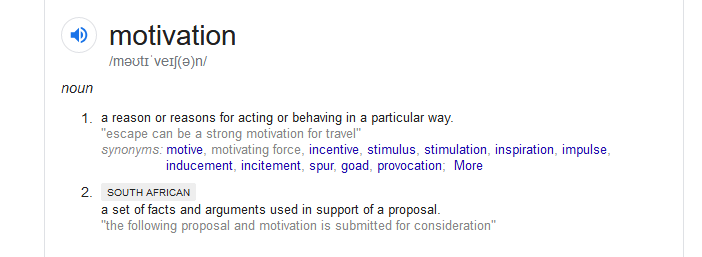We all have our own ideas of motivation, however one good example definition is as follows:
The mental processes that arouse, sustain, and direct human behaviour.
Scientists define motivation as your general willingness to do something. It is the set of psychological forces that compel you to take action.
The author Steven Pressfield discusses motivation is his book, The War of Art, which gets at the core of motivation. To paraphrase Pressfield:
At some point, the pain of not doing it becomes greater than the pain of doing it.
While some tasks, jobs or situations may be difficult in the short term, motivation means you recognize that not doing these things will cause greater difficulty in the medium to long-term. This is motivation and drives us to solve problems, perform difficult but necessary tasks and generally get on with life.
Getting motivated
We have talked in previous blog posts about linking motivation and enjoyment.
Motivation is often comes after starting a new behavior, not before.
Motivation is often the result of action, not the cause of it. Getting started, even in very small ways, is a form of active inspiration that naturally produces momentum.
Former professional Tennis player Arthur Ashe – the first black winner of Wimbledon title must have overcome many internal and personal challenges for his success said this:
Start where you are. Use what you have. Do what you can.
Success is a journey, not a destination. The doing is often more important than the outcome.
One important key to success is self-confidence. An important key to self-confidence is preparation.
Once a behavior is started you shouldn’t need much motivation to keep it going. There is always inertia to overcome at the beginning of a task and recognizing that fact helps you overcome it.

Pablo Picasso – inspiration exists but it must find you working
Once you start, progress occurs naturally and challenges are dealt with as they arise.
Tips for staying and getting motivated
Here are some example tips that will help you get and stay motivated.
#1 Schedule your motivation
Don’t wait for inspiration, schedule. Spanish painter and sculptor Pablo Picasso was renowned for his work ethic:
Inspiration does exist, but it must find you working.
And
Action is the foundational key to all success.
Setting a schedule for yourself seems simple, but it puts your decision-making on autopilot by giving your goals a time and a place to live. It makes it more likely that you will follow through regardless of your motivation levels.
#2 Set goals and make sure they interest you
Goals give you a direction to focus on – one that’s measurable and has an endpoint. This can help you to stay motivated.
#3 Break up your task into smaller parts
A whole project can seem daunting at first. Start with easier tasks and work your way up to bigger challenges. Breaking up a task in your mind into achievable chunks helps build confidence.
#4 Recognise the power and importance of habit forming
There are three simple steps you can take to build better rituals and make motivation a habit.
- Start with a simple prompt to get started.
- Do something physically or mentally that takes you along the path to performing a task.
- Repeat.
#5 Be realistic – the Goldilocks rule
Once you get motivated and start a task it is important to keep it going. This is dependent on keeping in an optimal zone.
Tasks that are significantly below your current abilities are boring. Tasks that are significantly beyond your current abilities are discouraging.
We can call this phenomenon The Goldilocks Rule. The Goldilocks Rule states that humans experience peak motivation when working on tasks that are right on the edge of their current abilities. Not too hard. Not too easy. Just right.
While there will be bumps in the road where tasks are too hard or to easy, sustainable success is achieved by achieving long term focused effort.
You will never regret doing good work once it is done.
Keyturn’s Personal Development programme include modules on Unlocking Team Potential, Unlocking Personal Potential, Making Meetings Work and Conflict Resolution.
Get in touch with Keyturn through our contact page or call us on 01788 815500.

